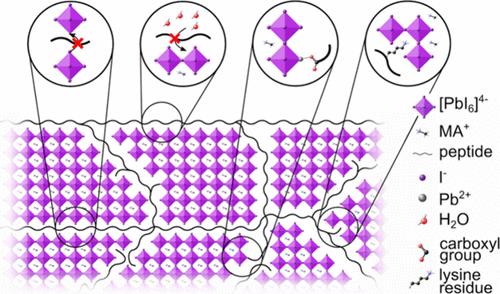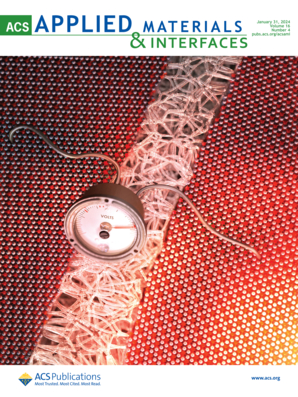使用肽水凝胶添加剂开发耐水、可调的 Perovskite 吸收器
IF 8.3
2区 材料科学
Q1 MATERIALS SCIENCE, MULTIDISCIPLINARY
引用次数: 0
摘要
近年来,水凝胶已被证明是一种简单而廉价的添加剂,可改善有机金属卤化物包晶石(OHPs)的光学特性和材料稳定性,大多数研究都集中在亲水性石化聚合物的使用上。在此,我们利用严密控制的原位 X 射线光电子能谱 (XPS) 技术,在实际压力下研究了肽水凝胶在钝化缺陷位点和提高碘化甲铵铅 (MAPI, CH3NH3PbI3) 稳定性方面的作用。光学测量结果表明,在传统的一步法 MAPI 制造过程中,将肽加入前驱体溶液中可以降低缺陷点的密度。增加肽的浓度可减小 MAPI 晶体尺寸,这归因于水凝胶孔径的减小,同时光带隙的增大也与量子尺寸效应的预期一致。XPS 定量分析进一步证明了 MAPI 晶体的封装,表明表面化学计量与均匀混合体系的预期标称值差别不大。原位 XPS 显示,加入多肽后,真空中的热诱导降解会减少,而近环境压力 XPS(NAP-XPS)显示,在 9 毫巴水蒸气压力下,这种增强作用会部分保持,使用 3 wt % 的多肽载荷加热后,表面甲基铵(MA+)的损失会减少。多肽含量为 3 wt % 时,最大功率转换效率 (PCE) 为 16.6%,而含量为 0 wt % 的装置为 15.9%,前者在 35% 相对湿度 (RH) 下储存 480 小时后仍能保持 81% 的最佳效率,而含量为 0 wt % 的装置仅能保持 48%。本文章由计算机程序翻译,如有差异,请以英文原文为准。

Toward Water-Resistant, Tunable Perovskite Absorbers Using Peptide Hydrogel Additives
In recent years, hydrogels have been demonstrated as simple and cheap additives to improve the optical properties and material stability of organometal halide perovskites (OHPs), with most research centered on the use of hydrophilic, petrochemical-derived polymers. Here, we investigate the role of a peptide hydrogel in passivating defect sites and improving the stability of methylammonium lead iodide (MAPI, CH3NH3PbI3) using closely controlled, in situ X-ray photoelectron spectroscopy (XPS) techniques under realistic pressures. Optical measurements reveal that a reduction in the density of defect sites is achieved by incorporating peptide into the precursor solution during the conventional one-step MAPI fabrication approach. Increasing the concentration of peptide is shown to reduce the MAPI crystallite size, attributed to a reduction in hydrogel pore size, and a concomitant increase in the optical bandgap is shown to be consistent with that expected due to quantum size effects. Encapsulation of MAPI crystallites is further evidenced by XPS quantification, which demonstrates that the surface stoichiometry differs little from the expected nominal values for a homogeneously mixed system. In situ XPS demonstrates that thermally induced degradation in a vacuum is reduced by the inclusion of peptide, and near-ambient pressure XPS (NAP-XPS) reveals that this enhancement is partially retained at 9 mbar water vapor pressure, with a reduced loss of methylammonium (MA+) from the surface following heating achieved using 3 wt % peptide loading. A maximum power conversion efficiency (PCE) of 16.6% was achieved with a peptide loading of 3 wt %, compared with 15.9% from a 0 wt % device, the former maintaining 81% of its best efficiency over 480 h storage at 35% relative humidity (RH), compared with 48% maintained by a 0 wt % device.
求助全文
通过发布文献求助,成功后即可免费获取论文全文。
去求助
来源期刊

ACS Applied Materials & Interfaces
工程技术-材料科学:综合
CiteScore
16.00
自引率
6.30%
发文量
4978
审稿时长
1.8 months
期刊介绍:
ACS Applied Materials & Interfaces is a leading interdisciplinary journal that brings together chemists, engineers, physicists, and biologists to explore the development and utilization of newly-discovered materials and interfacial processes for specific applications. Our journal has experienced remarkable growth since its establishment in 2009, both in terms of the number of articles published and the impact of the research showcased. We are proud to foster a truly global community, with the majority of published articles originating from outside the United States, reflecting the rapid growth of applied research worldwide.
 求助内容:
求助内容: 应助结果提醒方式:
应助结果提醒方式:


